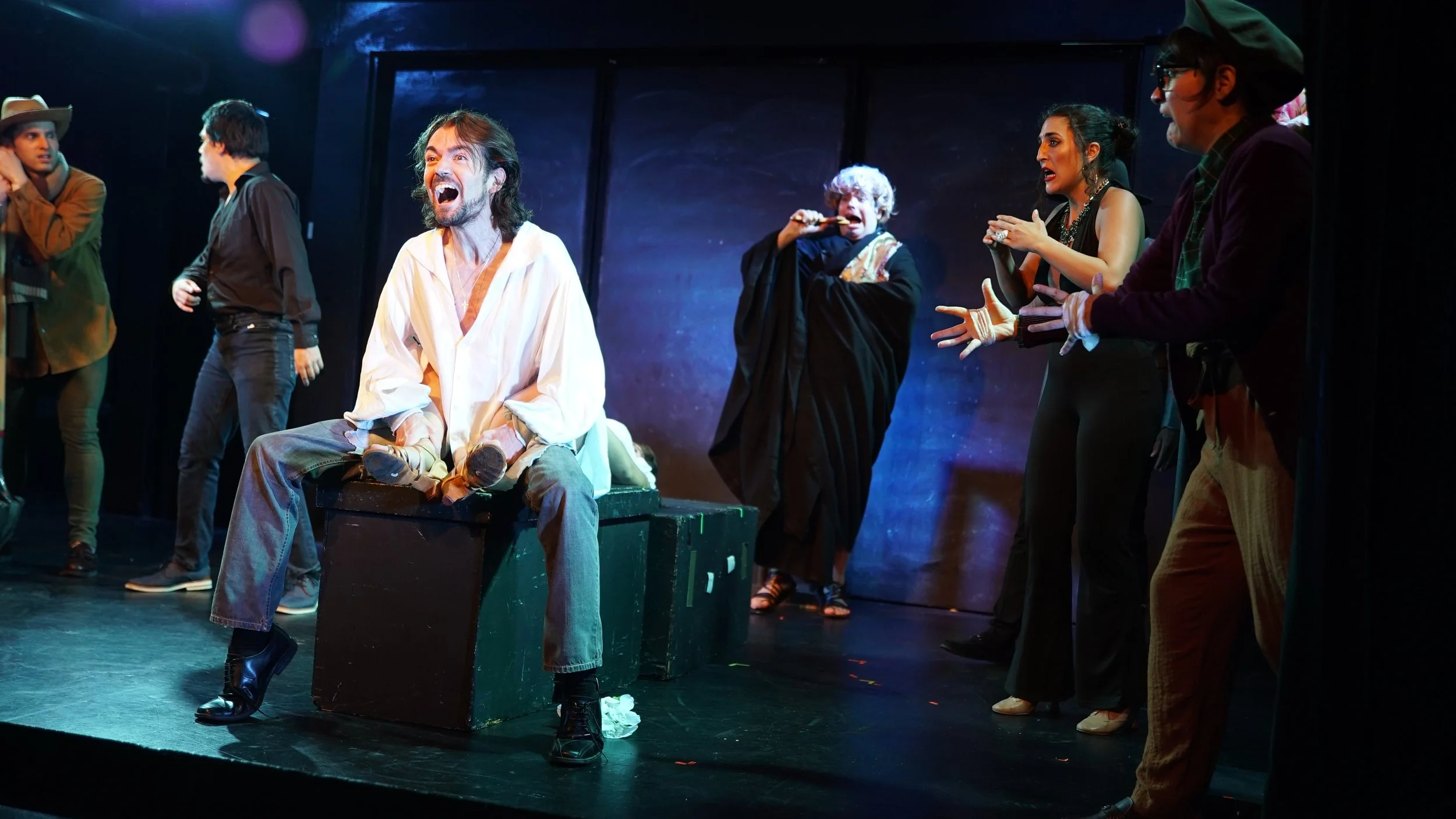Hamlet: La Telenovela
Translation/Literary Adaptation by José María Ruano de la Haza
Directed By Federico Mallet
UNDER St. Mark’s Theatre | 94 St. Mark’s Place, NYC
Photos by Miguel Marzón
The theatrical gods have conspired in favor of that most psychologically tortured of Danish princes offering intrepid theatergoers a radically hysterical reinterpretation of Hamlet - an absolute joy for the culturally ravenous and the merely Dane-curious alike. José María Ruano de la Haza, in his translation/literary adaptation, gives us Hamlet: La Telenovela towering above all other reinterpretations for its audacity and sheer theatrical delight. A mere three or four performances is not nearly enough of a run for this whirling, high-octane burst of tragicomic flair.
One might be forgiven for raising an eyebrow at the concept: Shakespeare via telenovela? And in Spanish, with English supertitles? But this production does not merely translate the play—it transfigures it. Directed by and starring the indomitably charismatic Federico Mallet, Hamlet: La Telenovela reimagines the brooding Dane as a melodramatic antihero swept into the hurricane-force passions and betrayals of a soap-operatic Denmark.
And what a Denmark it is! A technicolor fever dream of royal intrigue, familial vengeance, and succulent scandal, all cloaked in the lace-trimmed, rhinestone-encrusted vestments of the genre it so lovingly lampoons. The production wisely dispenses with the ghostly prologue in favor of a raucous opening scene that is half funeral, half wedding reception—a brilliant narrative efficiency that immediately situates the audience in a world where secrets are currency and surveillance is the national pastime. Indeed, Hamlet’s eavesdropping during a salsa-flecked dance sequence (a cheeky take on a group Macarena) with Laertes sets the tone for a show that revels in its playful staging while never losing sight of the emotional stakes.
The plot, as ever, revolves around the murder of King Hamlet, whose spectral presence (the endlessly versatile Nestor Carrillo here dressed like Vicente Fernández ready to sing some ranchera, and later doubling as several minor characters with comedic verve) galvanizes young Hamlet’s descent into theatrical madness. Andy Price's Claudio is a deliciously conflicted usurper—more manipulative politician than moustache-twirling villain—decked out in a cowboy hat and multiple neckchains including one that spells out KING (just in case he forgets his new role)and Regina Romero’s Gertrudis inhabits the role with a telenovela queen’s poise and powdered glamour, suggesting that denial, too, can be a kind of royal strategy.
Ofelia (played with formidable presence by Maria Elisa Mantilla) is no mere fragile flower here. Her descent into madness is reimagined with fiery independence, complete with a cathartic musical number that turns lament into rebellion and a face hilariously more running-mascara than skin. Her mother Apolonia (a gender-swapped, scene-stealing take on Polonius by Georgina Saldaña Wonchee) is a handheld-fan-wielding tour de force of meddling maternal excess. Her son Laertes (Gabriel Rosario) smolders with just enough shirt-unbuttoned narcissism to suggest he may be mourning his sister and his own reflection.
Throughout, the production walks a tightrope between parody and sincerity with breathtaking finesse. The fourth wall is not so much broken as gleefully pulverized. Advertisements for fictional luxury products intrude between scenes, offering the only moments where Shakespeare's original verse is quoted verbatim—an inspired inversion that recontextualizes the Bard as cultural wallpaper, still beautiful, still selling something. These interstitials, combined with lurid lighting and soundtrack choices that would make a daytime Emmy judge weep, create the sensation not of watching a play but of channel-surfing through the subconscious of a very dramatic aristocracy.
Yet for all its camp and comic grandeur and page-flipping of the magazine Hola!, the production never loses sight of its tragic roots. The adaptation, which wisely trims away Fortinbras and forgets Rosencrantz and Guildenstern (except in a sly aside from Hamlet), is sharply focused and narratively lean. It hits every thematic nerve with precision: grief, madness, revenge, the corrosive nature of power, and the ultimate futility of it all. The finale, with Martha Preve Ayora’s hilariously exasperated Horacio lamenting the carnage, reframes the conclusion not just as tragedy but as farce—a castle full of nobles undone not by fate, but by ego.
The ensemble crackles with chemistry and comic timing. Mallet, whose Hamlet is equal parts brooding heartthrob and manic clown, commands the stage with the gusto of a man who knows he is doomed and intends to make a scene about it. Ayora’s Horacio, the nerdy straight man to Hamlet’s chaos, becomes a kind of Greek chorus in glasses, while Carrillo’s gravedigger delivers the line “These people are crazy!” with the world-weary resignation of someone who has watched too many TV dynasties collapse.
Ultimately, Hamlet: La Telenovela achieves that most elusive of theatrical alchemies: it makes Hamlet feel new. Not with gimmicks, but with heart, wit, and a deep understanding that the play’s obsessions—lust, betrayal, madness, revenge—are already telenovela fodder. It doesn’t mock Shakespeare; it unleashes him.
Exuberant, inventive, and uproariously funny, Hamlet: La Telenovela is a glittering triumph. One leaves not only entertained but oddly invigorated, wishing that this Hamlet—like all good soap operas—might just go on forever.
Hamlet: La Telenovela played its last performance on August 10.
Hamlet: La Telenovela was part of FRIGID NY’s Little Shakespeare Festival
for FRIGID programming and info visit www.frigid.nyc
Review by Tony Marinelli.
Published by Theatre Beyond Broadway on August 15, 2025. All rights reserved.






